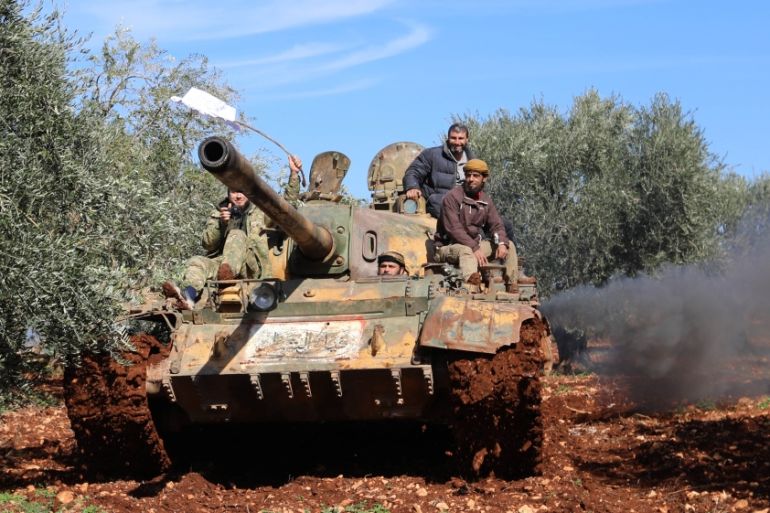Turkey denies reports Syria will help YPG in Afrin
Turkey says reports Syrian army will aid Kurdish YPG in Afrin are false, adding such a move will be a ‘major disaster’.

Turkey‘s deputy prime minister has dismissed as “false” media reports that Syrian government forces were poised to enter a Kurdish enclave in Syria‘s Afrin.
Bekir Bozdag, however, warned any move by Syrian soldiers to help the Kurdish People’s Protection Units, or YPG, repel a Turkish offensive in northwestern Syria would be a “major disaster” for the region.
Keep reading
list of 4 itemsWorld Food Programme to end general assistance in northwest Syria
Erdogan open to meeting al-Assad but not to withdrawal from Syria
Middle East Roundup: What’s going on with Saudi Arabia and China?
Turkey will continue its air and ground offensive against the YPG “with determination until the last terrorist is rendered ineffective”, Bozdag told reporters after a weekly cabinet meeting on Monday.
He was responding to a report by the Syrian state-run SANA news agency earlier in the day that said pro-government forces would enter Afrin “within a few hours to support its people’s stand against Turkish regime’s attack”.
The report by SANA raised fears of a potential clash between Turkish troops and Syrian forces, which are backed by Russia and Iran.
SANA said the planned deployment followed an agreement between the Syrian government and the YPG.
But a spokesman for the YPG denied agreeing on a deal with Damascus.
|
|
“There is no agreement. There is only a call from us for the Syrian army to come in and protect the borders,” Nouri Mahmoud told Reuters news agency late on Monday.
Syrian President Bashar al-Assad‘s troops pulled out of most of northern Syria in 2012, as nationwide protests against his rule spiralled into a civil war.
The YPG, part of the US-backed umbrella organisation Syrian Democratic Forces, gained control of large swathes of territory in northern Syria during the course of an offensive against the Islamic State of Iraq and the Levant (ISIL, also known as ISIS).
US support for the YPG has infuriated Turkey as it considers the group a “terrorist” organisation. Ankara sees YPG as part of the banned Kurdistan Worker’s Party (PKK), which has waged a decades-long bloody rebellion against the Turkish state in southeastern parts of the country.
On January 20, Turkey opened a new front in the long-running Syrian war when it launched a major offensive to expel YPG fighters from Afrin.
Mevlut Cavusoglu, Turkey’s foreign minister, speaking at a news conference in Amman, Jordan, said his country would hit back if Assad’s forces intervened in Afrin to help the YPG.
“If the regime is entering to protect the YPG, then no one can stop us, stop Turkey or the Turkish soldiers,” he said.
Turkey’s state-run Anadolu news agency on Monday reported President Recep Tayyip Erdogan held telephone conversations with his Russian and Iranian counterparts about the latest developments in Afrin.
Russia’s stand could determine how the conflict plays out, said Kamran Matin, a lecturer at the Sussex University in the United Kingdom.
“A lot depends on the details of this agreement [between the Syrian government and the Kurds] and whether or not Russia is on board,” he told Al Jazeera.
“If Russia is indeed supporting this deployment, that means it would act in defence of its ally in case of an attack by Turkish forces on Syrian forces in Afrin. Or more easily, it can close the airspace for the Turkish air force to operate, which would make any military operation by Turkey very difficult because it is the superior air force that has given them the edge in Afrin.”
The foreign ministers of Turkey, Iran and Russia are set to meet in Istanbul, Turkey’s largest city, on March 14.
|
|